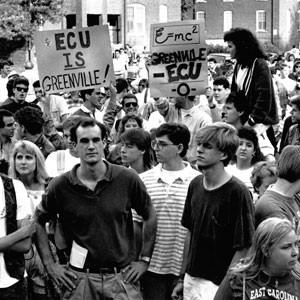
Relations between East Carolina and Greenville have always been close, and often extremely positive. However, when the Greenville City Council decided, by a 4-2 vote, to abolish a permit allowing groups to exceed allowable noise limits twice a year, things turned adversarial. ECU students, led by Student Government Association president Charlie T. “Chip” Roakes III protested the decision, expressing dismay over being left out of the decision-making process. According to Roakes, the students wanted “to be heard.”
On November 6, 1989, a rally known as “Purple Monday” was staged on the campus mall. In addition to carrying signs and wearing purple arm bands, approximately one thousand students signed a petition protesting the city’s decision. The petition was presented to the Greenville City Council on November 9 following a march from campus to city hall. SGA president Roakes affirmed that the students were “valuable citizens of the town of Greenville.” He added that they “want to be a part and want to help,” but insisted that “some things have got to change.” Students also staged a one-day boycott of local businesses.
Greenville mayor Edward E. Carter commented that students have the right to boycott if they wanted but that they should understand “others have rights too.” Carter, Greenville’s first African-American mayor, defended the city council decision, saying that it was made “to protect the rights of city residents who had complained about noise and unruly behavior.”
In addition to the noise ordinance, protesters were upset over the handling of a Halloween disturbance at Tar River Estates resulting in the arrest of 134 people. Students complained that police arrived “looking for trouble,” “arresting anyone who was in the area without telling the crowd to disperse.” One former student, Adele M. Goodman, 24, related, “We were totally violated. I just felt helpless.” Greenville police claimed that they had instructed the crowd to disperse, and when ignored, began arresting violators.
The controversy impacted Greenville’s mayoral election in which Carter faced councilwoman Nancy M. Jenkins, Leo W. Jenkins’ widow. In a debate held at ECU between Carter and Jenkins, Carter allowed that he would support an investigation of police conduct. Jenkins defended the police, claiming they were protecting people from harm in “a mob situation.” However, Jenkins criticized Carter for ignoring a committee recommendation that the noise permit system not be changed. When Jenkins declared her “shock that the committee was not heard and their findings were not followed,” she received “loud applause.” Jenkins promised that if elected, the council would reconsider the ordinance.
In the 1989 election, Jenkins was elected mayor. She was reelected six consecutive times, remaining in office until 2003. The noise ordinance controversy had decisively shifted mayoral politics into the hands of those with strong ties to the university and its students. Prior to marrying Dr. Leo Jenkins, Nancy Jenkins had come to Greenville as the wife of Professor David Middleton. Later, she remarried, following the passing of Dr. Leo Jenkins’ first wife. As Leo Jenkins’ wife, Nancy Jenkins accessed halls of power dominated by her second husband. With the family name of one of Greenville’s most esteemed leaders and her own well-noted political acumen, Nancy Jenkins pioneered a new stage in Greenville politics, one wherein the interests of the university and its students came to dominate.
Sources
- “ECU students boycott city businesses.” Daily Tar Heel. November 6, 1989. P. 6.
- “ECU students plan boycott of businesses.” Rocky Mount Telegram. November 5, 1989. P. 42.
- “ECU students rally, take part in one-day boycott.” Rocky Mount Telegram. November 7, 1989. P. 2.
- “Students Rally Against Noise Law.” Asheville Citizen-Times. November 8, 1989. P. 14.
Citation Information
Title: Noise Ordinance Protest
Author: John A. Tucker, PhD
Date of Publication: 7/18/2019